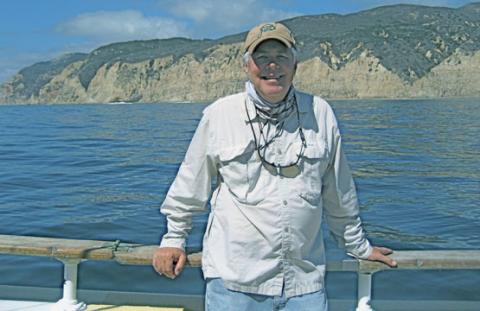
Consultant
The identification and development of human therapeutics is an exciting and rewarding field. It offers an opportunity for intellectual stimulation as well as practical value.
Education
- B.A., Clinical Science, San Francisco State University
- M.A., Microbiology, San Francisco State University
- Ph.D., Medical Microbiology, University of California, Davis
Contact
What is your current job and what does it entail?
I am an independent consultant working with several biotechnology and pharmaceutical companies. I worked for Amgen, a prominent biotechnology company, for over 17 years in a number of capacities including vice president of research. I retired from that position in 1999. My responsibilities have included various roles in therapeutic compound discovery and development. Presently my activities involve the search for and commercialization of novel technologies related to medical therapeutics. In this regard, marine organisms represent an important source of natural products directed against a variety of physiological targets that are presently under investigation by a number of organizations. In addition, I have an adjunct faculty position in the biomolecular science and engineering program at the University of California, Santa Barbara, campus and have participated in their Center for Entrepreneurship and Engineering Management.
What was the key factor in your career decision?
The identification and development of human therapeutics is an exciting and rewarding field. It offers an opportunity for intellectual stimulation as well as practical value. New developments are happening all the time in our basic understanding of disease and in methods of therapeutic intervention. The field offers opportunities for scientific involvement at any one of a number of stages during the discovery and development of new pharmaceuticals, from the initial identification of a disease target or therapeutic compound through to the successful approval of a new product.
What do like most about your career?
The opportunity to translate new biological observations into pharmaceutical treatments of medical value. Science today offers many exciting opportunities for researchers to have a positive impact on society. New developments in biotechnology and pharmaceutical sciences constantly challenge our abilities to translate today's information into tomorrow's therapeutics. New observations of organisms that live in extreme environments are making important additions to our understanding of basic life processes and how to influence them.
What do you like least about your career?
Human disease is often frustrating in its complexity. As with other areas of science, it is easy to become disenchanted during periods when it seems like little meaningful progress is being made. It is very rewarding, though, when a new observation opens the doors to a medical breakthrough. Everything worthwhile requires some sacrifice.
What do you do to relax?
I enjoy the work that I do so I am afraid that I do not have much in the way of hobbies. I do like the outdoors and enjoy hiking and golf. I feel that a scientific background provides one with a special appreciation of natural wonders.
Who are your heroes/heroines?
Not surprisingly, I have a very high regard for Nobel Prize winners.
What advice would you give a student who expressed an interest in pursuing a career in your field?
Pick an area that holds your interest, not just one that seems easy or one where you feel that you may be able to get the most recognition. I think that the people who pursue an area of science because they really like it are those who ultimately are the most successful. Often the window of opportunity in a field is not apparent when you first begin, but the field can subsequently become exciting in ways that are not obvious from the start. The important thing is to get a good appreciation of the scientific method. There is always room at the top of any field.
Are career opportunities in your field increasing or decreasing and why?
I feel that opportunities in science in general, and specifically in therapeutics, are on the increase. Society is becoming much more sophisticated in understanding and using new technologies. Medicine, agriculture and the environment will all benefit from the new insights and enthusiasm of the next generation of scientists. This creates a greater demand for well-trained individuals who can tackle the tough problems and find gratification in their solution.
What will you be doing 10 years from today?
The field will change a good deal in the next 10 years and I plan to remain active in it. I enjoy science for both personal and professional reasons and hope to still be involved in the discovery process.

